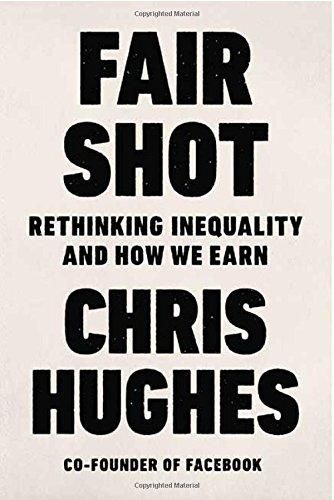Facebook co-founder Chris Hughes proposes a practical solution to widespread inequality: a guaranteed income for all Americans who earn less than $50,0000 annually.

A Guaranteed Income
A universal basic income stems from the idea that society should provide all people with a minimum level of income. But that’s not what Chris Hughes, a co-founder of Facebook, argues for in this compelling, original read. Instead, he calls for a more narrow and specific form of income only for those who need it. Hughes grew up in small-town North Carolina in limited circumstances, enjoyed incredible success and so brings a unique perspective to the United States’ current inequities. Hughes believes that a guaranteed income would make society fairer, more humane and more compassionate.
This thoughtful treatise on remaking economic policy has garnered serious consideration from, among others, Microsoft founder Bill Gates, who said, “I admire Chris’s commitment to apply his talent, experience and wealth to tackle some of our toughest problems.” Senator Cory Booker said, “As we strive to build a fairer, more inclusive country, Fair Shot is a very important read.” And Robert Reich, former US Secretary of Labor and bestselling author of Saving Capitalism, added, “Chris Hughes – one of the lucky ones – explains why we need a guaranteed income and how his life experiences have brought him to this conclusion.”
Discussions of basic guaranteed income arise increasingly in the media, in politics and in online forums. If Hughes’s account draws your interest, you can further explore this topic with Give People Money by Annie Lowrey and Andrew Yang’s The War on Normal People.
Facebook’s Context
To contextualize the environment in which Facebook grew, Hughes explains that from the Great Depression through to the mid-1970s, the US government’s power increased. Corporations fought that power with lobbyists and conservative, free-market think tanks that became ideological powerhouses battling President Jimmy Carter’s attempts to protect consumers.
The Wild West structure of the early Internet enabled a few companies to corner very large markets.Chris Hughes
Presidents Ronald Reagan and George H.W. Bush deregulated industries, reduced tariffs and, Hughes notes, cut taxes to benefit the wealthy. He offers the astonishing statistic that in 1968, the top US tax rate was 75%; by 1988, it was 28%.
Hughes’s Background
Despite their modest means, the author’s parents tithed to their church, as does Hughes. After selling his Facebook stock, Hughes donated to political causes, like marriage equality; guided the digital team of Barack Obama’s presidential campaign; and published The New Republic. Hughes reports learning about The GiveWell organization, which made direct “cash transfers” to poor villagers in Africa. GiveWell’s effectiveness shaped Hughes’s thinking and, with his associates, he started the Economic Security Project to explore the idea of a straight-up cash giveaway.
Addressing Poverty
Hughes argues for a fundamental change in how society tackles poverty. He notes that cash transfers give recipients freedom from oppressive, possibly racist government systems. Hughes cites research showing this financial transfer makes people happier, mentally healthier and more satisfied. He believes cash transfers can fight US economic inequality.
Over the past couple of years, many technology and business leaders have come to believe we need a guaranteed income because of the threat of artificial intelligence.Chris Hughes
Hughes is adamant in asserting that society must ensure people’s financial security in the face of oncoming mass automation and job losses. He seeks an economy that lets everyone thrive.
Hughes posits that every adult in households making less than $50,000 per year should receive $500 a month from the federal government. This, he suggests, would help 20 million people rise out of poverty and would improve the middle class’s financial stability. The author clarifies that no one earning more than $50,000 annually would receive payments.
The United States actually came close to establishing “an income floor” in the 1960s. Hughes relates that, surprisingly, President Richard M. Nixon proposed a bipartisan group to reform welfare programs and establish a guaranteed income.
Happiness and Dignity
Hughes details what many studies have found: Meaningful work makes people happier, healthier and longer-lived. Joblessness makes them depressed and irritable. Unemployed people abuse drugs and alcohol more often than the employed do, and the jobless die of suicide at higher rates.
The author holds that when people ask for government help, officials ask intrusive questions and set punitive requirements, some of which play into racial stereotypes. He also evokes the 30 million people in the United States who are involved in unpaid caregiving, a segment that social policy ignores.
Income Inequality
A mere 1% of Americans, Hughes notes, control almost 40% of the country’s wealth. He wants them to pay more. He envisions capping deductions at 28% and raising tax rates on incomes above $250,000 by 50%.
The American Dream, the idea that we can all do a bit better than the generation that came before us, is an optimistic idea that we should cultivate and reinforce.Chris Hughes
A family making $300,000 a year, he promises, would only pay a few thousand dollars more in taxes; billionaires would pay millions more. This would finance a guaranteed income for more than 90 million people without adding to the national debt.
A Restructuring
Chris Hughes follows successful Silicon Valley figures, such as Bill and Melinda Gates and others, in wanting to use his wealth to generate substantial positive change for 99% of Americans. He presents a thoughtful, well-researched and persuasively argued manifesto for an idea that, he believes, transcends political boundaries and embraces forward-thinking economic policies. Hughes makes these policies and their implementation clear while not oversimplifying his ideas in search of a broader audience. There is nothing naive or pie-in-the-sky about his proposals. Readers from any political position and all economic ones – save possibly those in the upper 1% – will find rich food for thought and possible inspiration from Hughes’s reasoned, readable solution to apparently intractable problems.





